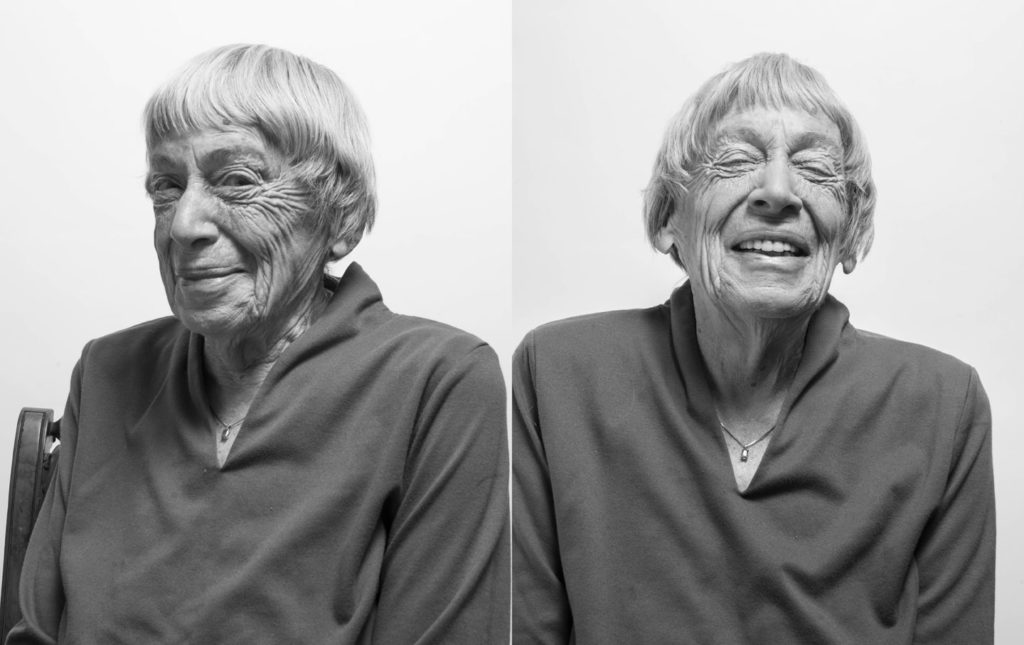The thing about Ursula K. Le Guin was that she didn’t actually look like a rabble-rousing, bomb-throwing, dangerous woman. She had a gentle smile, as if she was either enjoying herself or enjoying what the people around her were doing. She was kind but firm. She was petite and gray haired, and she appeared, at least on first inspection, harmless.
The illusion of harmlessness ended the moment you began to read her words, or, if you were so lucky, the moment you listened to her speak.
She was opinionated, but the opinions were informed and educated. She did not suffer fools or knaves gladly, or, actually, at all. She knew what she liked and what she wanted, and she didn’t let that change. She was sharp until the end. She once reviewed a book of mine and was not altogether kind about all of it, and I discovered as I read her review that I would rather have been chided by Ursula K. Le Guin than effusively praised by any other living author.
She inspired me as a boy, and as a young man, and as a grown-up writer. I learn more from her books at every stage of life than from any other writer: she bears rereading well.
Her books were wise. When she wrote science fiction, she understood that the political and social sciences were part of the science in the fiction, that anthropology was the scientific place where the what ifs happened. When she wrote fantasy, she grounded it in reality, and in the deep reality of who human beings are, of what matters, of the magic of language. When she wrote allegory, she created stories that changed the people who read it for the better. I have taught The Ones Who Walk Away from Omelas to students each year for the last five years, and I discover something deeper and more disquieting every time I read it with them, watch as it works its way inside them.
I was fortunate to have been allowed to introduce her at the National Book Awards in 2014 and to present her with the Lifetime Achievement Medal. I wrote to Ursula before the awards ceremony, and I told her in an email how important she had been to me:
You have no idea how nervous I am at the idea of writing to you. You’ve been one of my heroes since I bought A Wizard of Earthsea with my pocket money at the age of 11. Your SF shaped my head as a teenager, and told me that anything was possible and that events occur in context. Your essays on writing shaped me as a writer (something that occurs to me every time the train home passes through Poughkeepsie), and your later essays made me begin to think of myself as a feminist, and to change the way that I thought about men, about women, about language, about stories, about abortion.
I asked her if there was anything she wanted me to say in her introduction.
Her reply was characteristic:
Having sat through five-minute thank-you speeches that seemed to last three hours, I thought I’d enliven the gratitude with some very brief remarks about (for one thing) the big publishers’ practice of grossly overcharging public libraries for ebooks, limiting access, etc. I know you’re a true library lion. So I wanted to check if you’d welcome this, and if so we could maybe kind of strike the same note—or at least tell you, so that if I do say some things that our publishers will perceive as ungrateful, subversive, unladylike, etc., it won’t take you by surprise.
Her speech accepting her medal at the National Book Awards that night was the speech of a dangerous woman—it was an attack on publishing ways, on Amazon, a defence of libraries and the intellect and, most importantly, a call to arms about the future of writing and of writers. She said the things that nobody was saying, things that seem more and more relevant as time passes:
Hard times are coming, when we’ll be wanting the voices of writers who can see alternatives to how we live now, can see through our fear-stricken society and its obsessive technologies to other ways of being, and even imagine real grounds for hope. We’ll need writers who can remember freedom—poets, visionaries—realists of a larger reality … Books aren’t just commodities; the profit motive is often in conflict with the aims of art. We live in capitalism, its power seems inescapable, but then so did the divine right of kings. Any human power can be resisted and changed by human beings. Resistance and change often begin in art. Very often in our art, the art of words.
I’m glad I was there. More than that, I count myself lucky to have been alive and reading when Ursula K. Le Guin was writing and talking and walking the world, and giving us her words.
Neil Gaiman is an author of short fiction, children’s books, novels, graphic novels, audio theater, and films. His notable works include the comic book series The Sandman and the novels Stardust, American Gods, Coraline, and The Graveyard Book. He has won numerous awards, including the Hugo, Nebula, and Bram Stoker awards, as well as the Newbery and Carnegie medals.
from The Paris Review http://ift.tt/2nagp7B

Comments
Post a Comment